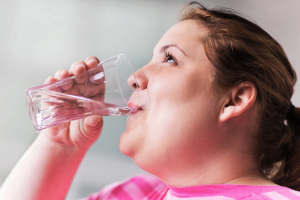 Dehydration is the most common reason for readmission to the hospital after bariatric surgery. Knowing the symptoms can help you prevent dehydration before it can become a medical issue.
Dehydration is the most common reason for readmission to the hospital after bariatric surgery. Knowing the symptoms can help you prevent dehydration before it can become a medical issue.
Symptoms of dehydration can include:
- Thirst
- Dizziness
- Fever
- Dry skin
- Fatigue or confusion
- Headache
- Constipation and/or hard stools
- Decreased urine output
- Dark colored urine
- Dry mouth
- Changes in blood pressure and heart rate
These are just some of the possible symptoms, and certainly not all symptoms have to be present to be dehydrated, . But, knowing the potential symptoms can help you catch dehydration before it becomes a problem.
Drinking at least 64 ounces of water per day is a good goal to prevent dehydration (unless your doctor has given you other instructions). For those who have had weight loss surgery, including gastric sleeve, gastric bypass, or lap band surgery, the internal changes in your body can make drinking 64 ounces more of a challenge than for others. Bariatric patients have to be mindful that they are drinking enough. To ensure you have access to plenty of fluids, carry a water bottle with you to sip wherever you go. Remind yourself to drink even if you don’t feel thirsty, set a timer if you have to. Keep track of how much you drink, especially if you think you may not be drinking 64 ounces.
Dehydration can be dangerous, and is best to be prevented. Know the symptoms, and seek medical attention if you think you are experiencing dehydration. Those who have had bariatric surgery should be especially mindful of drinking enough to prevent dehydration.
The above is offered by Dr. Shillingford, MD, PA, a board certified surgeon specializing in advanced laparoscopic and obesity surgery. Dr. Shillingford’s gastric sleeve, gastric bypass, and lap band patients are encouraged to drink at least 64 ounces of water per day. Tips and reminders (such as how much water to drink) can be found on Dr. Shillingford’s Facebook page. Click it, like it, learn about it!



